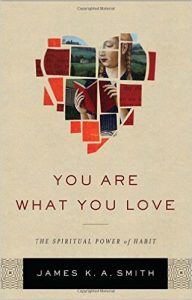 After reading You Are What You Love by James K.A. Smith, I can almost imagine Morpheus from The Matrix looking at me with his highly reflective glasses and saying in his ominously insightful voice, “What if I told you that people are more than thinking things?”
After reading You Are What You Love by James K.A. Smith, I can almost imagine Morpheus from The Matrix looking at me with his highly reflective glasses and saying in his ominously insightful voice, “What if I told you that people are more than thinking things?”
Are we more than that, or are people simply “brains on a stick?” Are we merely receptacles for knowledge? Do we exist because we are thinkers, or is there more to humanity than what fills our minds? The trouble with Descartes’ famous “I think, therefore I am” is that it “assumes that the ‘heart’ of the person is the mind,” as Smith notes. The distance between head and heart is further and more meandering than we might first expect, and yet so many of us know well the frustration of thinking one thing and doing another.
This insight serves as the beginning point of You Are What You Love, and from this realization Smith not only dismantles the idea that more knowledge will change our habits (and thereby our lives), but also draws the reader back to the foundational practices of Christian worship as modes of re-calibrating our hearts. The reality is, all of us love something (or many things). We (even if we don’t realize it consciously) are moving toward a goal, an end reality that compels us. We may be moving towards the goal of self-sufficiency, or stability, or popularity. Or perhaps we are moving towards being formed in the likeness of Jesus.
Whatever goal we are moving toward will be reflected in our habits and daily practices. The problem is: we may think we are moving toward one goal when in reality we are inclined towards goals that are quite different (even opposite) from what we think. We may think by filling ourselves with more knowledge that we are somehow altering the way we live. The trouble is, there is often a vast difference between what we think we love and what we truly love.
You Are What You Love encourages the reader to think reflectively about daily practices and routines. Everything we do is also doing something to us. Whether or not we’re aware of it, our daily practices are like liturgies that deeply form us subconsciously. These liturgies are inclining us toward a goal, toward what we love. When we have engaged these liturgies with regularity, they become second nature. We don’t even realize we’re doing what we do, even though what we are doing is continuing to form and shape us.
Interestingly enough, it is at this point that Smith calls for the church to examine its liturgies. Are we actually engaging in habits and liturgies that are inclining us away from what life in Christ ought to look like in the hopes of being relevant? Or, are we staying close to the movements and rhythms of liturgy and worship that seep deep into our bones and transform us more and more into the likeness of Christ? “Liturgies, then, are calibration technologies,” James K.A. Smith writes.
Smith continues, “In short, if you are what you love, and love is a habit, then discipleship is a rehabituation of your loves. This means that discipleship is more a matter of reformation than of acquiring information.” As a caution, Smith’s premise should not be considered anti-intellectual. Far from that. Rather, we cannot see our heads as the primary way of bringing about long-lasting adaptive change. Information may provide us with a reason to want to change, but formation is the deeper process of transforming our loves into things that lead us to our goal of becoming like Christ.
Throughout the rest of the book, Smith looks at the formative practices of weekly worship, family rituals, Christian education and discipleship, youth ministries, and work/vocation. As a pastor of a church with a relatively standard, reformed liturgical format, I was particularly convicted by Smith’s reminder that “worship is not for me – it’s not primarily meant to be an experience that ‘meets my felt needs…’ rather, worship is about and for God.” Everything we do in worship should be about God, and for God, and is not designed simply to be something that allows me to express myself. Yet, somehow within the structures and routines that are about and for God, we are given the opportunity to use our imaginations and creativity to sing a new (yet old) song to God.
As a parent of small children, I most appreciated Smith’s challenge to see daily life as a series of habits that are contributing to the formation (or de-formation) of my loves and desires. It’s also important to take stock of what those habits are teaching my children as my children’s understanding of God is forming. What does it teach my children about coming to the Lord’s Table if our family dinner table is always so cluttered we can’t see each other over the mess? What are my children learning about God if Mommy is always so busy at church that they never see her? What habits and liturgies am I enacting when the first action of every day is to check my smartphone?
What we love matters, and the habits we develop may yield more insight into what/who we’re loving than any amount of information and words might. Convicting stuff for a type-A person like me who loves information, but a necessary invitation to examine who I am and what I love.
I am reminded of the famous hymn line, “Tune my heart to sing Thy grace.” Somehow, through the grace of God and through the ordinary habits of life, our hearts can be tuned to sing in key with the song of the church and all of God’s creation.
Come, thou Fount of every blessing,
tune my heart to sing thy grace;
streams of mercy, never ceasing,
call for songs of loudest praise.
Teach me some melodious sonnet,
sung by flaming tongues above.
Praise the mount I’m fixed upon it
mount of God’s redeeming love.

My Thoughts
